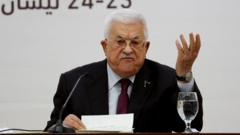President Trump has proposed U.S. control over Gaza, suggesting a resettlement for Palestinians akin to his real estate projects, highlighting the family's rising business interests in that area. However, his aides clarified there wouldn't be a military presence.
The Trump Family's Expanding Business Interests in the Middle East Amid Gaza Controversy

The Trump Family's Expanding Business Interests in the Middle East Amid Gaza Controversy
President Trump's latest Gaza proposal raises eyebrows as the region becomes increasingly significant for his family's business ventures, led by Jared Kushner.
In recent developments, President Trump proposed a significant plan concerning Gaza, a strategy that envisions the U.S. seizing control of the region and resettling its long-time inhabitants. This move has generated widespread debate, particularly as it aligns with the Trump family's growing portfolio of business investments in the Middle East. Jared Kushner, Trump's son-in-law, has already hinted at the potential value of Gaza’s waterfront for redevelopment.
The Trump Organization's involvement in the region includes initiatives in Oman for a golf course and hotel, alongside interests in Saudi Arabia, the United Arab Emirates, and Qatar. Discussions surrounding the Gaza proposal reflect a combination of geopolitical maneuvering and business considerations.
Trump's vision for Gaza included building new housing developments that would provide jobs and modern living conditions for displaced Palestinians. In his remarks, he suggested that it would be preferable for them to reside in improved settings rather than return to their original homes in Gaza. His enthusiasm for U.S. involvement in the region was captured in his claim that "everybody loves the idea of the United States owning that piece of land."
However, amidst this proposal, there are complexities. Trump’s aides clarified that the administration has not made any commitments to deploy military forces to enforce such actions, possibly trying to mitigate backlash from a plan perceived by many as provocative or unrealistic.
The intersection of Trump's foreign policy proposals and his family's business interests raises essential questions about ethics, nationalism, and the appropriateness of intertwining state actions with personal gain. As public discourse unfolds around the potential ramifications of Trump's proposals, the implications for the long-standing Israeli-Palestinian conflict and U.S. foreign policy will be significant and merit careful consideration.
The Trump Organization's involvement in the region includes initiatives in Oman for a golf course and hotel, alongside interests in Saudi Arabia, the United Arab Emirates, and Qatar. Discussions surrounding the Gaza proposal reflect a combination of geopolitical maneuvering and business considerations.
Trump's vision for Gaza included building new housing developments that would provide jobs and modern living conditions for displaced Palestinians. In his remarks, he suggested that it would be preferable for them to reside in improved settings rather than return to their original homes in Gaza. His enthusiasm for U.S. involvement in the region was captured in his claim that "everybody loves the idea of the United States owning that piece of land."
However, amidst this proposal, there are complexities. Trump’s aides clarified that the administration has not made any commitments to deploy military forces to enforce such actions, possibly trying to mitigate backlash from a plan perceived by many as provocative or unrealistic.
The intersection of Trump's foreign policy proposals and his family's business interests raises essential questions about ethics, nationalism, and the appropriateness of intertwining state actions with personal gain. As public discourse unfolds around the potential ramifications of Trump's proposals, the implications for the long-standing Israeli-Palestinian conflict and U.S. foreign policy will be significant and merit careful consideration.




















